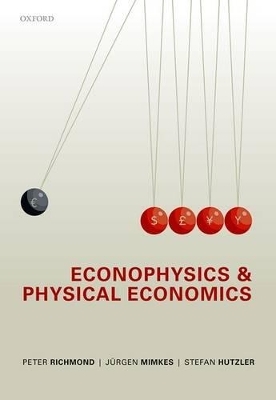
Econophysics and Physical Economics
Oxford University Press (Verlag)
978-0-19-967470-1 (ISBN)
An understanding of the behaviour of financial assets and the evolution of economies has never been as important as today. This book looks at these complex systems from the perspective of the physicist. So called 'econophysics' and its application to finance has made great strides in recent years. Less emphasis has been placed on the broader subject of macroeconomics and many economics students are still taught traditional neo-classical economics.
The reader is given a general primer in statistical physics, probability theory, and use of correlation functions. Much of the mathematics that is developed is frequently no longer included in undergraduate physics courses. The statistical physics of Boltzmann and Gibbs is one of the oldest disciplines within physics and it can be argued that it was first applied to ensembles of molecules as opposed to being applied to social agents only by way of historical accident. The authors argue by analogy that the theory can be applied directly to economic systems comprising assemblies of interacting agents. The necessary tools and mathematics are developed in a clear and concise manner. The body of work, now termed econophysics, is then developed. The authors show where traditional methods break down and show how the probability distributions and correlation functions can be properly understood using high frequency data. Recent work by the physics community on risk and market crashes are discussed together with new work on betting markets as well as studies of speculative peaks that occur in housing markets.
The second half of the book continues the empirical approach showing how by analogy with thermodynamics, a self-consistent attack can be made on macroeconomics. This leads naturally to economic production functions being equated to entropy functions - a new concept for economists. Issues relating to non-equilibrium naturally arise during the development and application of this approach to economics. These are discussed in the context of superstatistics and adiabatic processes. As a result it does seem ultimately possible to reconcile the approach with non-equilibrium systems, and the ideas are applied to study income and wealth distributions, which with their power law distribution functions have puzzled many researchers ever since Pareto discovered them over 100 years ago. This book takes a pedagogical approach to these topics and is aimed at final year undergraduate and beginning gradaute or post-graduate students in physics, economics, and business. However, the experienced researcher and quant should also find much of interest.
Peter Richmond studied physics at Queen Mary College, University of London. His career included periods in academia including the Institute of Advanced Studies, ANU Canberra, and the Physics Laboratories, University of Kent. Most recently, in particular during the period spanning the volatile financial era from 1997-2007 and the great housing crash, he was with the School of Physics, Trinity College Dublin. During this period he introduced new research activity concerned with econophysics and gave a course on the subject to final year undergraduates. From 2003-2012 he was chair of two major concerted actions spanning 26 countries across Europe and sponsored by COST; 'Physics of Risk' (2003-2007) and 'Physics of Cooperation and Conflict' (2008-2012). He holds a DSc from the University of London and is a Fellow of the UK Institute of Physics. His publications cover aspects of condensed matter physics, colloids, econophysics, and sociophysics. Jürgen Mimkes studied physics at Georgia Augusta University, Göttingen and the Free University Berlin from 1959 to 1967. After a postdoctoral position at the University of Missouri, Rolla, USA he was Assistant Professor in solid-state thermodynamics at the Technical Universities in both Berlin and Clausthal. From 1977 to retirement in 2004, he was Professor of Physics at the University of Paderborn. He has held visiting appointments in College Park, Maryland, and Chuo University, Tokyo. Stefan Hutzler studied physics at the Universität Regensburg, Germany, and the University of Reading, UK. In 1997 he obtained his PhD from Trinity College Dublin, Ireland, where he is now Associate Professor in the School of Physics. He is also a Fellow of the College. His research interests are the physics of foams, packing problems, and complex systems. He has co-authored over 120 publications in these areas, including 'The Physics of Foams' (together with Prof. Denis Weaire), published by Oxford University Press in 1999.
1. Introduction ; 2. Reading financial data ; 3. Basics of probability ; 4. Time dependent processes and the Chapman-Kolmogorov equation ; 5. The Langevin approach to modelling Brownian motion ; 6. The Brownian motion model of asset prices ; 7. Generalized diffusion processes and the Fokker-Planck equation ; 8. Derivatives and options ; 9. Asset fluctuations and scaling ; 10. Models of asset fluctuations ; 11. Risk ; 12. Why markets crash ; 13. Two non-financial markets ; 14. An introduction to physical economics ; 15. Laws of physical economics ; 16. Markets ; 17. A simple model of trade ; 18. Production and economic growth ; 19. Economics and entropy ; 20. Approaches to non-equilibrium economics ; 21. The distribution of wealth in society ; 22. Conclusions and outlook
| Zusatzinfo | 111 b/w illustrations |
|---|---|
| Verlagsort | Oxford |
| Sprache | englisch |
| Maße | 180 x 253 mm |
| Gewicht | 720 g |
| Themenwelt | Naturwissenschaften ► Physik / Astronomie ► Angewandte Physik |
| Naturwissenschaften ► Physik / Astronomie ► Festkörperphysik | |
| Naturwissenschaften ► Physik / Astronomie ► Thermodynamik | |
| Wirtschaft ► Allgemeines / Lexika | |
| Wirtschaft ► Betriebswirtschaft / Management ► Finanzierung | |
| Wirtschaft ► Volkswirtschaftslehre ► Makroökonomie | |
| Wirtschaft ► Volkswirtschaftslehre ► Ökonometrie | |
| ISBN-10 | 0-19-967470-1 / 0199674701 |
| ISBN-13 | 978-0-19-967470-1 / 9780199674701 |
| Zustand | Neuware |
| Haben Sie eine Frage zum Produkt? |
aus dem Bereich


